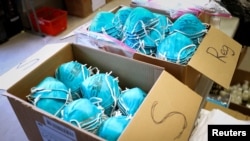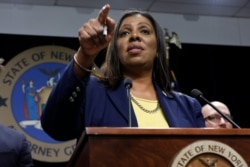Lu Ping does battle for her adopted country armed with a smartphone.
Every day from 6 a.m. to midnight, Lu coordinates donations of masks, medical supplies and money to Chinese Americans Support Hospitals (CASH), a GoFundMe group she started with friends in response to the COVID-19 outbreak in the United States.
The group's mission is to get needed supplies for hospitals in the Washington, D.C., metro area, which includes portions of Maryland and Virginia, and is known by residents as the DMV.
"This is my home," Lu said about why she spends hours on WeChat, the Chinese version of WhatsApp, soliciting donations. "I must help."
Her group is not alone. Chinese Americans throughout the United States are mobilizing to provide supplies and equipment to front-line medical professionals, even as the FBI warns of the likelihood of an increase in hate crimes targeting Asian Americans as the pandemic continues.
"The community itself, just in general, is organized," Mai Ngai, a professor of Asian American studies and history at Columbia University, told The New York Times recently. "Chinese have all kinds of associations — some based on profession, and some based on the region your family comes from in China," she said. "There's a history of networks, and a history of coming together when there's an issue."
A graduate of China's Zhejiang University medical school, Lu emigrated from Shanghai to the United States in 1998. The stay-at-home mom represents many, if not most, of the Chinese Americans who have built lives in new places that have not always been welcoming.
"We cannot be completely separated from China," said Wei Wu, minister of the Chinese Christian Church of Germantown, Maryland, who co-founded CASH. "Whatever happens in China reflects on us, even if this is our home. That's why right now, we feel targeted and insecure because there are people here who are not happy with China."
Critics say President Donald Trump heightened this tension by calling COVID-19 the "Chinese virus" last month.
He later said he would stop using the term.
Since COVID-19 emerged in Wuhan, China, late last year, it has swept through 209 countries, sickening 1.3 million people, and killing 75,000 as of Tuesday. There are more than 368,000 confirmed cases and 10,000 deaths in the United States.
Two California-based groups, Chinese for Affirmative Action and the Asian Pacific Planning and Policy Council, set up a hate crime reporting center in March and have recorded hundreds of incidents.
New York Attorney General Letitia James also launched a hotline to cope with an increase in reports of harassment and assaults, as well as the use of slurs against all Asian Americans during the coronavirus outbreak.
Which is why Ryan Lin bought not one gun but two.
"My wife has been against me having a gun, but this time, she made no objection," said Lin, a resident of the same leafy Maryland suburbs as Lu and Wei. Afraid for his family, Lin asked VOA not to use his real name.
Lu created CASH as a WeChat group on March 17, and within days some 400 people joined. WeChat is heavily censored by China's Communist Party and used regularly as a platform for its propaganda. But for those with family and friends in China, it is the preferred social media platform for staying in touch.
Many CASH members were part of an informal group started a week earlier by Liang Zhao, a native of Hebei province, who arrived in the U.S. in 1998. With a life science background, he and friends who are medical and pharmaceutical professionals anticipated a shortage of protective gear in the U.S. as they watched the epidemic take hold in China.
"We were worried about the health workers on the front lines, and we wanted to do something to show that we Chinese Americans care about our community," Zhao told VOA Mandarin. "It's our own home."
As of March 31, the two groups, working with another grassroots Chinese American group, have raised about $100,000. Zhao said with that money, they reached out to medical suppliers approved by the Food and Drug Administration (FDA) in China and the United States.
The first shipment from China — 112,000 surgical masks, 3,000 N95 masks, more than 1,000 gowns and 360 face shields — was delivered to 12 local hospitals on Friday.
Yaya Zhang, a native of Jiangsu province who arrived in the U.S. in 2004, is a real estate agent and a CASH co-founder responsible for acquiring masks. She believes she and other members are making a meaningful contribution. CASH has collected 650 surgical masks — 20 N95 and about 900 Chinese-approved KN95.
'We are American'
Lu is also president of the Alumni Association of Zhejiang University in the Washington, D.C., area, which has partnered with the Chinese Alumni Associations of Greater Washington to express alarm about the rising xenophobia.
"We are American," the groups proclaim. "Guard our homeland and fight the epidemic."
But that sentiment has not protected them from racial attacks.
The Committee of 100 (C100), a nonpartisan organization of prominent Chinese Americans, issued a statement March 25 condemning "racially charged slurs, actions, and violence against the Chinese American and Asian American community."
Lin, of Maryland, told VOA Mandarin that two men verbally attacked his younger sister a few days ago for wearing a face mask while she shopped at a Costco in Baltimore.
"They told her to go back to China and shouted at her that she shouldn't come out to infect others when she was sick," he said.
Lin said his sister's experience is what prompted him to buy the guns, despite Trump's call to "protect our Asian American community."
After living in the U.S. for 32 years, Lin said he is no longer sure of where he belongs.
"I have always regarded the United States as my own country, and now, I don't know which country I am (in)," he said.





